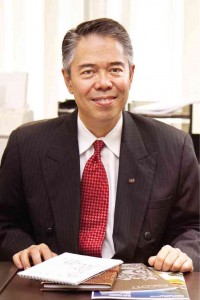The unparalleled devastation caused by Supertyphoon “Yolanda” has prompted company owners and chief executive officers to rush to their boardrooms and determine if their plans remain viable and assumptions still hold true, considering the inevitable slowdown in the country’s economic activity.
One company that has remained confident in the country’s prospects despite the havoc wreaked by Yolanda is The Ascott Limited, which has formulated plans to expand its operations in the Philippines on expectations that corporate travel will remain robust as economic growth continues.
The Ascott group is intent on at least doubling its inventory of managed properties in the Philippines in the next four years.
Ascott has three operating properties in Makati City’s central business district. These are the 306-unit Ascott Makati, 151-unit Somerset Millennium Makati and 147-unit Somerset Olympia Makati.
Set to be added to the inventory are the Ascott Bonifacio Global City Manila and Citadines Salcedo Makati (2014), Citadines Millennium Ortigas (2015) and the Somerset Alabang Manila (2017).
“We are confident in the Philippines’ sustained economic growth and see tremendous potential for serviced residences,” Arthur Gindap, Ascott regional general manager for the Philippines and Thailand, says in a statement.
“Currently, we have an inventory of over 600 units, making us the largest international serviced residence operator in the country. With our four upcoming properties, we will more than double this figure in the next four years,” he adds.
Citing Ascott’s data, the group has enough reason to be optimistic.
In 2012, Ascott’s three operating properties in the Philippines posted P1.24 billion in revenues and a gross operating profit of P758.8 million.
“These figures drive us toward maintaining a bullish stand in the market as we push for more expansions within and outside Metro Manila,” says Gindap.
Given the robust economic growth in the Philippines, other top brands have entered the local hospitality industry, and Ascott is very much aware of how stiff the competition for guests has become.
But the Singapore-based company, reputed to be the world’s largest international serviced residence owner-operator, believes that it has something unique to offer the market since it caters mainly to long-staying guests, or those who stay for more than a few days and are sick and tired of a 30-square meter hotel space where they are not free to prepare their own meals or entertain friends and family.
“We also offer exclusivity to our guests. Like at Ascott Makati, we only have one restaurant unlike normal hotels. Security is enhanced because there is not a lot of volume coming to the property,” Gindap tells the Inquirer. “Indeed, we offer a home away from home for a few weeks or months.”
The Ascott group has been in the Philippines since 2004, taking over the property in the Makati central business district that used to be managed by the Oakwood group.
Since then, the Ascott has been able to forge strong ties with multinational companies who house their expatriates at the Ascott before they find a more permanent home in either a condominium unit or a house in one of the gated subdivisions.
“We are also seeing a higher number of guests from Asia, like the Japanese and Singaporeans. The supply of rooms has definitely increased in the Philippines, but the demand has also increased,” says Gindap. “Half of our demand comes from those who stay maybe three to four days to a week. They like the kitchen and our location is fantastic.”
“What we are looking forward to is that the economic growth will translate to more investments coming in. More investments will mean more travelers coming in. We are setting ourselves up for what is coming in the future,” he adds.
He says that foreign direct investments are still not coming in as fast as expected, but he believes the deluge will come soon, and the group wants to be ready, thus the introduction of three brands in the Philippines.
These are the Ascott, where the units have as many as three bedrooms and amenities that top corporate travelers require; the Somerset, which is more for families; and the Citadines, which offers studio-type and one-bedroom units for small groups of travelers.
The first Citadines branded hotel is coming up in Salcedo Village in Makati City, and should open its doors by the first quarter of next year.
“In 2014, we will be opening our first Citadines-branded property in the Philippines. With all our three serviced residence brands present in the country, we are better poised to cater to guests’ unique stay preferences and requirements,” he says.
“We have always liked this market. We have been able to do good business here even when the market was tough. Our story for prospective business owners is that we can run your business as a hospitality model with the highest profit margin. We will make you the most money because our structure here is mature,” Gindap adds.
He does admit though that the new supply of rooms is ratcheting up the level of competition in the country, thus growth has been flat so far this year.
But then again, those in the hotel business always take a long view and are investing in the country for the long term.
“The plan is to have 10 properties by 2015, either operating or under development. We will like to be in Cebu, Quezon City and Ortigas,” he says. “We still have ways to go.”
